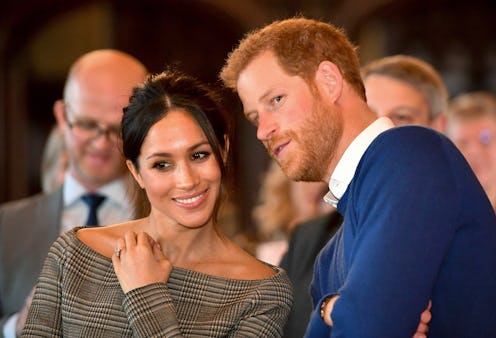Life
This Is Why Meghan Markle & Prince Harry Probably Won’t Get A Prenup

Gossip tabloids have been wildly speculating about the upcoming wedding of Meghan Markle and Prince Harry, and amid the furore over her dress choice and what they'll serve at the wedding dinner is another interesting legal question: will there be a prenuptial agreement? Typically, prenuptial agreements are legally binding documents drawn up before a marriage that outline how assets would be divided in case the people entering the marriage should later divorce. There's a lot of unsubstantiated rumors flying around about whether Harry and Markle will have one, but the reality, according to British legal experts, is that it's actually pretty unlikely.
This may be surprising to those aware of the British royal family's wealth — and of Markle's success. Forbes estimated the royal family's net worth in 2011 to be around $US500 million, and in November 2017 Fortune estimated the personal fortunes of Harry and Markle to be $40 million and $5 million, respectively. Often people with such sizable assets come into marriage with prenuptial agreements behind them, so that those assets are protected in case things go wrong. So why not in this case?
For one, it's not traditional for the British royals, or for European royalty in general. Prenuptial agreements for British royalty are largely unknown, but if they do exist, are so shrouded in secrecy that they're unlikely to ever be full public knowledge. It's not believed that Princess Diana and Prince Charles, Prince Harry's parents, had one; when they divorced in 1996, she received a lump sum settlement of $US24 million, Forbes reported, and an additional $US600,000 per year, as well as signed a confidentiality agreement. Sarah Ferguson, who divorced Prince Charles' brother Prince Andrew in the same year, received only $US1.8 million, according to the AP. In both cases, Diana and Ferguson were in possession of far less wealth than their husbands when they got married. (And these are the figures we know about; the settlement of Lord Snowdon, whose divorce from Princess Margaret in 1978 was the first royal divorce in Britain since 1540, is not public record, according to Town & Country.) If Duchess Kate and Prince William get divorced, it would likely be the same situation, as it's not believed they have a prenuptial agreement, either.
In this sense, Markle represents a shift from tradition, in that she possesses wealth of her own — but she, as the non-royal partner, is still the one with comparatively fewer assets. Under conventional British law, if there's no prenuptial agreement in a divorce, it's up to a judge to divide assets depending on things like standard of living, which partner was the breadwinner, and the ages of partners, with an aim for a fair split, but you can be sure that a royal divorce would be hashed out behind closed doors.
For a long time, prenuptial agreements were capable of being successfully challenged under U.K. law. That all changed in 2010, when the Supreme Court declared in the case of Radmacher (formerly Granatino) v Granatino that the divorcing couple's prenuptial agreement was binding given that certain preconditions were met: "the agreement is entered into freely; both parties fully appreciate the implications of the agreement; and it is fair to hold the parties to the agreement in the circumstances prevailing." So if Markle and Harry did obtain one, it would likely be legally binding — for the moment. One member of the Supreme Court disagreed with the judgement, and it could be overturned or a new precedent set, so it's possible they've been warned away from getting one in case the law shifts yet again.
If one of the pair decided to challenge a prenuptial agreement in British court, if they do have one, it would also be extremely hard to prevent the media from finding out. British law does have something called a "super-injunction" that's meant to prevent public figures in court from being revealed in the press, but it's not used often, and would likely not apply in the case of royal divorce. This is being played out in real time in the British media right now; Princess Tessy of Luxembourg, a former non-royal who is divorcing the country's Prince Louis after 11 years of marriage, has taken him to the U.K. Supreme Court to sort out a fair financial settlement after her initial proposal was "rejected," but the media has been blocked from reporting financial details by a High Court judge, according to the Telegraph.
It seems, then, that a traditional prenuptial agreement is likely out of the question. But you can be sure that Markle will be protecting her own interests going into her marriage — she didn't spend those years on legal drama Suits for nothing.